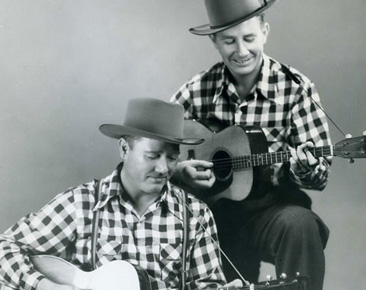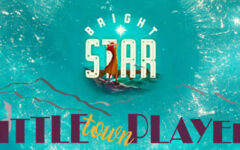
 Early country stars, the Delmore Brothers were huge influences on not only bluegrass and country music, but blues, folk, rock and roll, and more. The Delmore Brothers received a long overdue Distinguished Achievement Award from the International Bluegrass Music Association in 2014, recognizing their lasting impact on bluegrass music. In order to celebrate the legacy of the Delmore Brothers, I will be featuring a “Delmore Dedication” leading up to what would have been Alton Delmore’s 106th birthday on December 25th. Each day, I will showcase a different Delmore Brothers song and its popular bluegrass interpretations.
Early country stars, the Delmore Brothers were huge influences on not only bluegrass and country music, but blues, folk, rock and roll, and more. The Delmore Brothers received a long overdue Distinguished Achievement Award from the International Bluegrass Music Association in 2014, recognizing their lasting impact on bluegrass music. In order to celebrate the legacy of the Delmore Brothers, I will be featuring a “Delmore Dedication” leading up to what would have been Alton Delmore’s 106th birthday on December 25th. Each day, I will showcase a different Delmore Brothers song and its popular bluegrass interpretations.
Some readers may be familiar with my series of “Rodgers Remembrances” posts near Memorial Day which celebrated Jimmie Rodgers’ impact on bluegrass music. Due to not only the seeming interest those posts have drawn, but more from my own personal enjoyment of writing them, I have decided to do a related series honoring the Delmore Brothers.
It is no secret that I am a huge fan of the Delmore Brothers. Without a doubt, the highlight of my 2014 IBMA World of Bluegrass experience was to see Debby Delmore (Alton Delmore’s duaghter) posthumously accept a Distinguished Achievement Award in recognition of the music made by her father and uncle. To think of the amount of music made by two poor country boys from Elkmont, Alabama who tried out for the Grand Ole Opry with guitar cases made of feed sacks is simply overwhelming. The Delmores’ catalog is one of the richest in all of American music.
Alton Delmore was said to have written over 1,000 songs in his lifetime, many of which have become bluegrass standards. Early in their careers, the Delmore Brothers sent a song to Ralph Peer of Victor Records, with hopes that it would be recorded by Jimmie Rodgers. Ralph Peer was the mastermind behind “The Bristol Sessions” which has become known as “The Big Bang of Country Music.” Peer’s work lead to the success of country’s first two acts (Jimmie Rodgers and The Carter Family) and to the legitimacy of southern roots music in general.
Always on the lookout for new songs to be recorded by his artists, Peer was one of the first businessmen to understand the value of copyright. By copyrighting new songs rather than having his artists record previous hits, Peer made more money by owning the copyrights of the new songs. This was especially true of artists as successful as The Carter Family and Jimmie Rodgers. Rodgers’ sides were selling nearly 750,000 a piece, so the kickback on these songs was massive.
The song sent to Peer by the Delmore Brothers was ultimately accepted by Peer to be recorded by Rodgers, and would have definitely been a hit for Jimmie. It was a perfect to his bluesy style and even matched his “Singing Brakeman” moniker. Unfortunately, it was never recorded. Rodgers lost his battle with tuberculosis before he could record the song. However, it did end up becoming a signature song for the Delmore Brothers – Blue Railroad Train.
Blue railroad train
Going down the railroad tracks
It makes me feel so doggone blue
To listen to that old smokestackCome back again
Let me hear the whistle blow
You’re taking the sun and leaving the rain
And I hate to see you goBlue railroad train
Leaving me far behind
Gimme back the good old days
And let me ramble down the lineBlue railroad train
Leaving me her alone
You treat me good you treat me bad
You’re making me think of homeI’ve got the blues
I’m longing for your company
It’s many miles from where I am
To the only one for meIt’s lonely here
Waiting for the manifest
I hope that engineer is kind
Enough to let me be his guestI’m not as bad
As you might think I am
I hobo here I hobo there
I’ve traveled these states aroundBlue railroad train
A good old pal to me
You take me where I want to go
And my transportation’s free
Alton and Rabon Delmore’s brother harmonies throughout their original recording of this American classic are captivating. It’s obvious that the song was largely inspired by America’s Blue Yodeler, featuring many Rodgers-esque guitar licks. One aspect of the Delmores’ music which is very interesting and unique is the use of Rabon Delmore’s tenor guitar. Rather than play a second guitar or a mandolin, as is customary with most traditional brother duets, Rabon’s tenor guitar helped set them apart. This nearly extinct instrument has a unique tone, and Rabon’s arguably the most successful proponent of the instrument. Rabon’s original tenor guitar work matched with more traditional Rodgers-inspired bluesy runs makes for a great contrast on Blue Railroad Train.
Most (if not all) bluegrass fans are familiar with Tony Rice’s rendition of Blue Railroad Train. A standout cut on the essential (and controversial) bluegrass album, Manzanita, Blue Railroad Train became a signature song of Bluegrass Hall of Famer, Tony Rice. It is essential to any Rice aficionado’s repertoire, and require listening for any new bluegrass fan.
 Of course, Rice’s rendition has several notable differences when compared to the Delmores’ original. For one, Alton and Rabon sang the song as a duet all the way through, whereas Rice’s is sang solo, with harmony from Ricky Skaggs almost exclusively on the words “blue railroad train.” Rice’s guitar work is also a bit more intricate than that of the original, but what else should be expected by one of the greatest to ever play the instrument. Rice’s playing is so clean and crisp. His fingers fly across the frets, without sacrificing emotion in his playing. The way Rice plays this song, it’s as if his guitar is just as sad as he is. The Manzanita band’s playing in general really helps “grassify” this Delmore classic. Ricky Skaggs’ fiddle playing particularly blows me away, and Jerry Douglas’ dobro and Sam Bush’s mandolin really add the “cool” factor of this recording.
Of course, Rice’s rendition has several notable differences when compared to the Delmores’ original. For one, Alton and Rabon sang the song as a duet all the way through, whereas Rice’s is sang solo, with harmony from Ricky Skaggs almost exclusively on the words “blue railroad train.” Rice’s guitar work is also a bit more intricate than that of the original, but what else should be expected by one of the greatest to ever play the instrument. Rice’s playing is so clean and crisp. His fingers fly across the frets, without sacrificing emotion in his playing. The way Rice plays this song, it’s as if his guitar is just as sad as he is. The Manzanita band’s playing in general really helps “grassify” this Delmore classic. Ricky Skaggs’ fiddle playing particularly blows me away, and Jerry Douglas’ dobro and Sam Bush’s mandolin really add the “cool” factor of this recording.
While Blue Railroad Train has been recorded countless times in bluegrass by the likes of Doc Watson, Marty Stuart, Josh Williams, and even more recently by the Seepy Man Banjo Boys and Mark Newton & Steve Thomas, I don’t think any rendition has been as lasting or as memorable to bluegrass fans as this classic on Manzanita.







